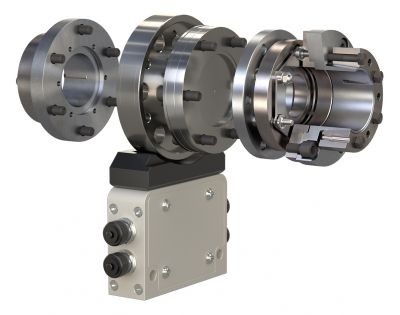Mayr Couplings Provide Accurate Measurement Results
Essential components for torque measuring flanges in test benches are shaft couplings, which reliably compensate for any shaft misalignments. In this way, they ensure accurate measuring results and also protect the bearings installed into the shaft train against wear. Based on the tried and tested, backlash-free and torsionally rigid Roba-DS construction series, Mayr Power Transmission offers compensating couplings which are specially tailored to the high requirements placed on them in measuring flanges.
Short development times, an improved degree of efficacy or increased energy saving potential – the requirements on test benches are consistently increasing. In this way, the performance requirements are increasing on torque measuring flanges as the core of modern test benches, which themselves have to supply precise and reliable data even in maximum performance and high-speed applications. Here, however, the measuring result is only as good as the shaft misalignment compensation coupling used, as shaft couplings are of decisive importance in order to minimize the disturbance variables affecting the measuring flange. Such disturbance variables frequently occur due to alignment errors in the drive line. Therefore, radial, angular and axial shaft misalignments occur in almost all applications between the input and output sides. Even a high-precision alignment of the shaft train with state of the art laser alignment devices can only assist to a certain extent. In addition, the misalignments cannot be completely eliminated due to the existing tolerances in the measurements of the components used and the external influences such as temperature. Therefore torsionally rigid shaft misalignment compensation couplings are used together with the measuring flange. Mayr offers Roba-DS compensating couplings, which are especially tailored to the requirements placed upon them by modern measuring flanges.
The Roba-DS disk pack couplings compensate for radial, axial and angular shaft misalignments. They not only ensure precise measurement results, but also protect the bearings installed in the shaft train against unnecessary loads and therefore against unnecessary downtimes and costs. On the Roba-DS couplings, the nominal torques stated in the catalogue can be used without any restrictions. A reduction of nominal torque due to offsets, load complexes or balance requirements is not required. The couplings are compact, and simultaneously unite high performance density with completely backlash-free function. They transfer torques up to the nominal torque completely backlash-free and with a consistently high torsional rigidity. The stated shaft misalignments can be utilized in total to 100 percent without affecting the transmittable torque.
The couplings are particularly robust and durable, and feature, in addition to their quiet running properties and low mass moment of inertia, a high balance quality. In this way, the standard constructional designs of the Roba-DS coupling cover, depending on the construction size, a speed range from 8,000 to 18,000 rpm, and are balanced to a balance quality of G 2.5 (reference speed 3,000 rpm). In the case of the high-speed constructional design, on which the individual parts are produced with extremely high accuracy (quality IT5) and reduced axial and shaft run-out tolerances, speed values of up to 30,000 rpm are permitted. The balance quality of the coupling is G 2.5 at a reference speed of 5,000 rpm.
The connection of the Roba-DS couplings and the measuring flanges on the shaft train are generally conducted backlash-free via high-quality shrink disk hubs. Different coupling construction designs especially tailored to the differing requirements of the test benches and flexible combination options also permit the integration of measuring flanges into almost any test bench and drive constellation.




